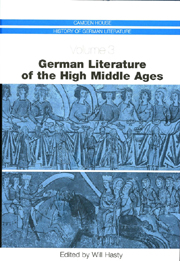Book contents
- Frontmatter
- Contents
- List of Illustrations
- Acknowledgments
- Introduction
- Part I The First Flourishing of German Literature
- Part II Lyric and Narrative Traditions
- Part III Continuity, Transformation, and Innovation in the Thirteenth Century
- Part IV Historical Perspectives
- Court Literature and Violence in the High Middle Ages
- Mobility, Politics, and Society in Medieval Germany
- Bibliography
- Notes on the Contributors
- Index
Mobility, Politics, and Society in Medieval Germany
from Part IV - Historical Perspectives
Published online by Cambridge University Press: 05 February 2013
- Frontmatter
- Contents
- List of Illustrations
- Acknowledgments
- Introduction
- Part I The First Flourishing of German Literature
- Part II Lyric and Narrative Traditions
- Part III Continuity, Transformation, and Innovation in the Thirteenth Century
- Part IV Historical Perspectives
- Court Literature and Violence in the High Middle Ages
- Mobility, Politics, and Society in Medieval Germany
- Bibliography
- Notes on the Contributors
- Index
Summary
THE LITERATURE OF MEDIEVAL GERMANY portrays a society in motion. In the Latin poem, Ruodlieb, which was written in the last third of the eleventh century in the Bavarian monastery of Tegernsee, the hero flees the arbitrary demands of lords in his homeland to wander about looking for the honorable service that he finally finds at the court of a good, but distant king. In one of medieval literature's great satires, the bard Ulrich von Liechtenstein travels from the Adriatic to Bohemia. Clad as a woman, Ulrich participates in a tournament in Friesach. Poor Heinrich (Der arme Heinrich) journeys from Germany to Sicily to seek medical aid in hope of curing a young peasant woman of leprosy. In describing the adventures of Parzival, Wolfram von Eschenbach leads his audience over a huge geographic expanse. Even the youthful Helmbrecht, son of a prosperous yeoman farmer, leaves home to seek fortune in the following of a robber baron. Further examples could easily be found.
The mobility depicted in this literature should not surprise us. Despite its reputation as a relatively static society, the civilization that produced medieval German literature was one with broadening geographic horizons. It is no wonder, then, that horizontal mobility left an imprint on the literature of this epoch. Although there certainly were peasants who lived out their years in ancestral villages and monks who never left the cloister, it is no exaggeration to state that German society during the twelfth and thirteenth centuries was a machine of perpetual motion powered by energies inherent in the political and social structures of that era.
- Type
- Chapter
- Information
- German Literature of the High Middle Ages , pp. 277 - 290Publisher: Boydell & BrewerPrint publication year: 2006



